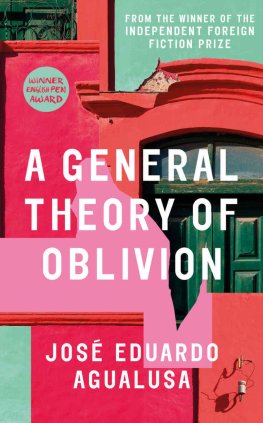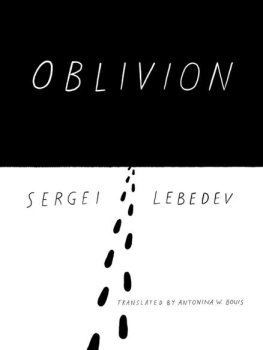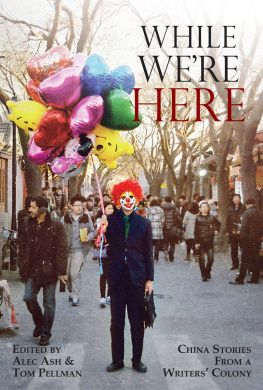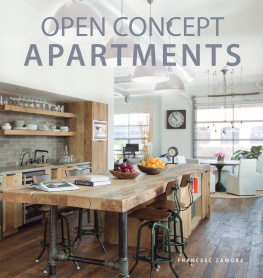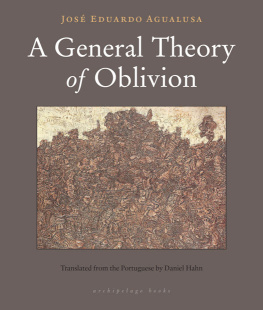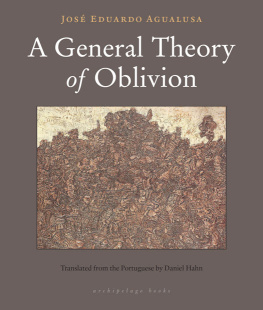Jos Eduardo Agualusa
A General Theory of Oblivion
The brilliant new novel from the winner of the Independent Foreign Fiction Prize.
On the eve of Angolan independence, Ludo bricks herself into her apartment, where she will remain for the next thirty years. She lives off vegetables and pigeons, burns her furniture and books to stay alive and keeps herself busy by writing her story on the walls of her home.
The outside world slowly seeps into Ludos life through snippets on the radio, voices from next door, glimpses of a man fleeing his pursuers and a note attached to a birds foot. Until one day she meets Sabalu, a young boy from the street who climbs up to her terrace.
Jos Eduardo Agualusa was born in Huambo, Angola, in 1960, and is one of the leading literary voices in Angola and the Portuguese-speaking world. His novel Creole was awarded the Portuguese Grand Prize for Literature, and The Book of Chameleons won the Independent Foreign Fiction Prize in 2007. Agualusa lives between Portugal, Angola and Brazil.
Ludovica Fernandes Mano died in Luanda, at the Sagrada Esperana clinic, in the early hours of 5 October 2010. She was eighty-five years old. Sabalu Estevo Capitango gave me copies of ten notebooks in which Ludo had been writing her diary, dating from the first years of the twenty-eight during which she had shut herself away. I also had access to the diaries that followed her release, as well as to a huge collection of photographs taken by the visual artist Sacramento Neto (Sakro) of Ludos texts and the charcoal pictures on the walls of her apartment. Ludos diaries, poems and reflections helped me to reconstruct the tragedies she lived through. They helped me, I believe, to understand her. In the pages that follow, I have made use of much of her first-hand accounts. What you will read is, however, fiction. Pure fiction.
Ludovica never liked having to face the sky. While still only a little girl, she was horrified by open spaces. She felt, upon leaving the house, fragile and vulnerable, like a turtle whose shell had been torn off. When she was very small six, seven years old she was already refusing to go to school without the protection of a vast black umbrella, whatever the weather. Neither her parents annoyance nor the cruel mockery of the other children deterred her. Later on, it got better. Until what she called The Accident happened and she started to look back on this feeling of primordial dread as something like a premonition.
After the death of her parents, Ludo lived in her sisters house. She rarely went out. She earned a little money giving Portuguese lessons to bored teenagers. Besides this, she read, embroidered, played the piano, watched television, cooked. When night fell, she would go over to the window and look into the darkness like someone leaning out over an abyss. Odete, irritated, would shake her head:
Whats the matter, Ludo? Scared of falling into the stars?
Odete taught English and German at the high school. She loved her sister. She avoided travel so as not to leave Ludo by herself. She spent her holidays at home. Some of her friends praised her selflessness, others criticised her for being excessively indulgent. Ludo couldnt imagine living alone. And yet she worried that she had become a burden. She thought of the two of them as Siamese twins, joined at the navel. Herself, paralysed, almost dead, and the other, Odete, forced to drag her along wherever she went. She felt happy and she felt terrified when her sister fell in love with a mining engineer. His name was Orlando. A widower, childless. He had come to the Portuguese city of Aveiro to resolve some complicated issue to do with an inheritance. An Angolan, originally from Catete, he lived between Angolas capital and Dundo, a town run by the diamond company for which he worked. Two weeks after theyd met, quite by chance, in a patisserie, Orlando asked Odete to marry him. Expecting her to turn him down, being familiar with her reasons, he insisted that Ludo would go to live with them in Angola. The following month, they were set up in a huge apartment on the top floor of one of the most luxurious buildings in Luanda. The so-called Prdio dos Invejados that is, the building of those who inspire envy.
The journey was hard for Ludo. She left home in a daze, under the effects of tranquillizers, moaning and protesting. She slept the whole flight. The following morning, she awoke to a routine similar to the one shed had back home. Orlando owned a valuable library thousands of titles, in Portuguese, French, Spanish, English and German, among which almost all the great classics of universal literature were to be found. Ludo had access to more books now, but also to less time, because she insisted on dispensing with the two maids and the cook, taking over all the domestic chores herself.
One evening, the engineer arrived home, carefully carrying a large cardboard box. He handed it to his sister-in-law:
This is for you, Ludovica. To keep you company. You spend too much time alone.
Ludo opened the box. Inside, looking fearfully at her, she found a little white newborn puppy.
Its a male. A German Shepherd, Orlando explained. They grow quickly. This ones an albino, rather unusual. He shouldnt get too much sun. What are you going to call him?
Ludo didnt hesitate:
Phantom!
Phantom?
Yes, he looks like a phantom. All white like that.
Orlando shrugged his bony shoulders.
Very well. Then Phantom he shall be.
An elegant, anachronistic wrought-iron staircase climbed in a tight spiral from the drawing room up to the terrace. From there, your eyes could take in a good part of the city, the bay, the Ilha promontory, and off in the distance a long necklace of abandoned beaches fringed by the fine lacework of the waves. Orlando had taken advantage of the space to construct a garden. A bower of bougainvillea threw its scented lilac shade over the coarse brick floor. In one of the corners grew a pomegranate tree and several banana trees. Guests were often surprised:
Bananas, Orlando? Is this a city garden or a backyard of a farm?
The engineer would get annoyed. The banana trees reminded him of the large yard, hemmed in by adobe walls, where he had played as a boy. If it had been up to him, he would have planted mango trees too, and medlar trees, and lots of papaya plants. When he came home from the office, this garden was where he used to sit, a glass of whisky within arms reach, a black cigarette alight between his lips, watching as night conquered the city. Phantom would be there with him. The puppy also loved the terrace. Ludo, meanwhile, refused to go up the stairs. In the first few months she did not even dare approach the windows.
The African sky is much bigger than ours, she explained to her sister. It crushes us.
One sunny April morning, Odete came back from the high school to have her lunch. Chaos had broken out in the capital, and she was thrilled and frightened. Orlando was in Dundo. He arrived back that night, and shut himself away in the bedroom with his wife. Ludo could hear them arguing. Her sister wanted to leave Angola as quickly as possible:
The terrorists, my love, the terrorists
Terrorists? Never use that word in my house again. Orlando never shouted. He whispered harshly, the sharp edge of his voice like a blade against the throats of his interlocutors. These so-called terrorists are fighting for the freedom of my country. I am Angolan. I will not leave.
Turbulent days passed. Demonstrations, strikes, rallies. Ludo closed the windows to prevent the apartment from being filled with the laughter of the people on the streets, which burst into the air like fireworks. Orlando, the son of a trader from Minho whod settled in Catete in the early years of the century, and a Luandan mestiza whod died in childbirth, had never nurtured family connections. However, one of his cousins, Vitorino Gavio, showed up again around this time. He had spent five months living in Paris, occupying himself with drink, women, plotting, and writing poems on paper napkins in the bistros that were frequented by exiles from Portugal and Africa, thereby acquiring the aura of a romantic revolutionary. He entered their house like a tempest, disordering the books in the bookcase, the glasses on the dresser, and unsettling Phantom. The puppy would chase around after him at a safe distance, barking and growling.

